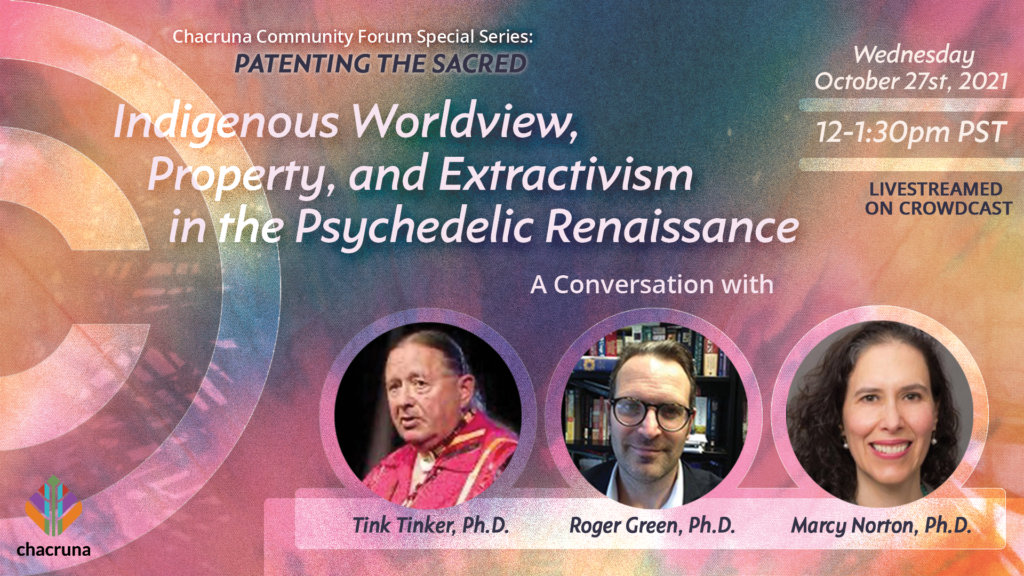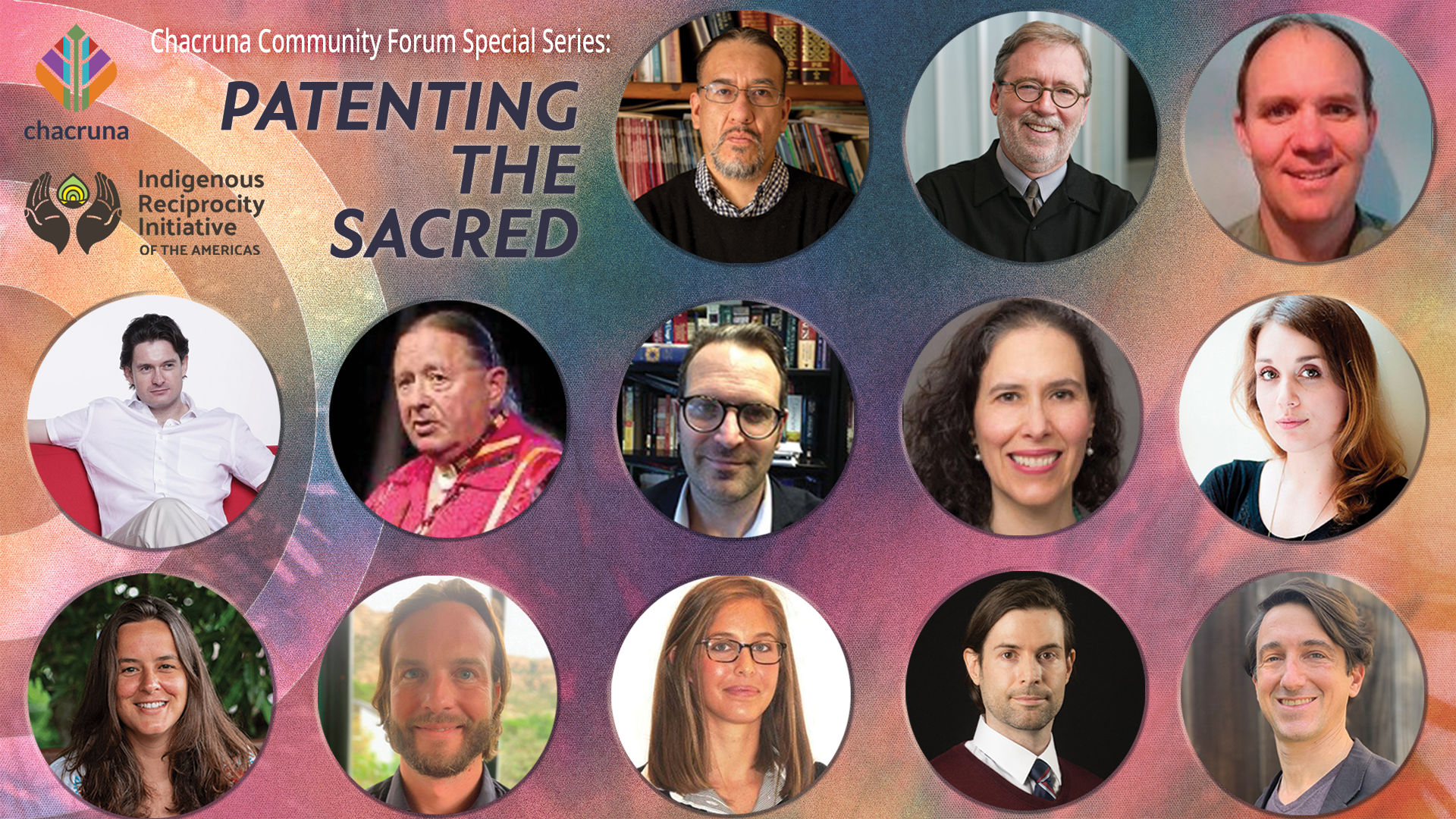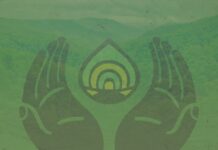- Course: Roots of Psychedelic Therapy: Shamanism, Ritual and Traditional Uses of Sacred Plants - June 6, 2025
- Indigenous Knowledge in the Digital Age - June 5, 2025
- Meet Chacruna at Psychedelic Science 2025 - June 5, 2025
On Wednesday, October 27, the Chacruna Institute for Psychedelic Plant Medicines will be promoting the fifth round of its “Patenting the Sacred” Community Forum Series with a live streamed conversation on “Indigenous Worldview, Property, and Extractivism in the Psychedelic Renaissance.” Professor Tink Tinker, Ph.D. (Eagle Clan, Wazhazhe/Osage Nation); Clifford Baldridge, Emeritus Professor of American Indian Cultures and Religious Traditions at Iliff School of Theology; and Professor Marcy Norton, Ph.D., Associate Professor of History at University of Pennsylvania, will discuss the extractive history of various substances and the impact of extractive thinking on Indigenous worldviews, joined and moderated by Professor Roger Green, Ph.D., Senior Lecturer in the Department of English at Metropolitan State University of Denver.
Our Patenting the Sacred series is related to our Indigenous Reciprocity Initiative of the Americas, and our mission to educate and promote critical thinking in the field of psychedelics.
“Our Patenting the Sacred series is related to our Indigenous Reciprocity Initiative of the Americas, and our mission to educate and promote critical thinking in the field of psychedelics. It’s bringing together experts in intellectual property, law, medicine, anthropology, sacred plants, and Indigenous worldview to deepen public discourse on critical issues that impact all of us inside the psychedelic renaissance,” says Bia Labate, Ph.D., Executive Director of the Chacruna Institute. “It’s incredible how much money is being poured into the new emergent psychedelic ‘industry,’ while so little time, money, and effort is put into understanding the implications of intellectual property on Indigenous people, researchers, therapists, and local businesses. It’s time to change that!” Labate continues: “This next section is a kind of peak of the series, as we will touch upon the topic of extractive thinking—a theme that has arisen across all the conversations and is central to deepening our understanding around the growing psychedelics market as it goes mainstream.”
It’s incredible how much money is being poured into the new emergent psychedelic ‘industry,’ while so little time, money, and effort is put into understanding the implications of intellectual property on Indigenous people, researchers, therapists, and local businesses.

Indigenous Worldview, Property and Extractivism in the Psychedelic Renaissance
Wednesday, October 27th 12-1:30pm PST
The series next turned to a conversation with Ian McGonigle, Ph.D., and Osiris Sinuhé González Romero, Ph.D., on Patenting Nature or Protecting Culture? Ethnopharmacology and Indigenous Intellectual Property Rights, which studied the costs and benefits of legally protecting plants to help present a deeper understanding of the ethical and epistemological issues of studying traditional medicine scientifically, including psychedelics. Building on the dominant themes of the series, Michael Brown, Ph.D., and Bia Labate then hosted a conversation on Protecting Indigenous Cultural Heritage, Moving Beyond Rhetoric, which highlighted how historical discourse around “biopiracy” had failed to be connected to meaningful praxis, and offered new strategies towards pragmatic solutions moving forward.
“Chacruna has gathered a diverse group of people for the Patenting the Sacred series and woven together a robust set of conversations that are unlike any others I’ve been in,” says IP attorney Chris Byrnes.
“Chacruna has gathered a diverse group of people for the Patenting the Sacred series and woven together a robust set of conversations that are unlike any others I’ve been in,” says IP attorney Chris Byrnes. “Creating space for a critical examination of the psychedelic renaissance and inviting voices to share visions and steps for strategic action is productive and exciting.”
“Having an opportunity to bring together so many different experts in this series has opened up new opportunities for collaboration and public engagement,” says Graham Pechenik, founder and registered patent attorney at Calyx Law, and a member of Chacruna’s Council for the Protection of Sacred Plants. “I look forward to the next conversations, and to continuing to learn from the recordings in the future. The entire series is a remarkable and unparalleled resource that I hope will shape thinking and decision-making on the subject.”
About Chacruna Institute
The Chacruna Institute for Psychedelic Plant Medicines, an organization co-founded by Brazilian anthropologist Dr. Bia Labate and American psychologist Dr. Clancy Cavnar, produces high-quality research on plant medicines and psychedelics and helps propagate academic knowledge in more accessible formats. We educate the public and create cultural understanding and legitimacy regarding these substances so that they may cease to be stigmatized and outlawed. Chacruna also promotes a bridge between the world of plant medicines and the emergent field of psychedelic science, between “traditional ceremonial use” and clinical and therapeutic settings, bringing the knowledge and perspectives of the social sciences to health care professionals and practitioners of psychedelic-assisted therapy. Finally, we foster cultural and political reflections on the field of psychedelic science and facilitate conversations about controversial topics that have been simmering on the sidelines as psychedelics go mainstream.
Contact Information
Brystal Karber
Chacruna Institute
[email protected]
415-390-6157
Take a minute to browse our stock:
Did you enjoy reading this article?
Please support Chacruna's work by donating to us. We are an independent organization and we offer free education and advocacy for psychedelic plant medicines. We are a team of dedicated volunteers!
Can you help Chacruna advance cultural understanding around these substances?














